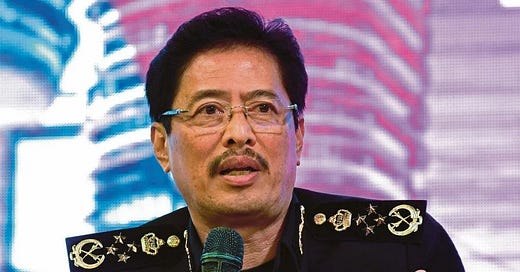Malaysia's Anti-Corruption Watchdog May be Too Far Gone to Fix
Insiders question agency’s ability to function
Upon the 72-year-old Anwar Ibrahim’s appointment as Malaysia’s prime minister on November 24, he said that the fight against corruption would be one of his administration’s highest priorities, with the country’s reputation battered not only by one of the biggest financial scandals in Asian history but by endemic sleaze in the coalition that had ruled the country for 70 years.
Anwar, just recently in his first return to Penang, where he grew up, stated the Malaysian Anti-Corruption Commission (MACC) is the body responsible for investigating corruption. However, the current Chief Commissioner of the MACC, Azam Baki, has been the subject of heavy criticism over personal shareholdings that appeared to be worth well beyond statutory limits prescribed by his position and in fact suspiciously large for someone in a civil service job. Further, the MACC itself was the subject of an expose involving the relationships that some senior officers had with business entities.
Moreover, the agency sat on several major investigations during the reign of former Prime Minister Najib Razak, who is serving 12 years in prison, most famously – or infamously – the investigation of the spectacularly corrupt 1Malaysia Development Bhd, which collapsed in incompetence and scandal with a loss of US$5.6 billion and left the government indebted for billions more. These allegations have tainted the integrity of the MACC, which has been credibly accused of selective investigation and prosecution, not just under the Barisan Nasional, which lost power in 2018, but also under the reign of Mahathir Mohamad as prime minister between 2018 and 2020, and with stories circulating about general corruption within the organization.
These criticisms have all been made by critics external to the MACC until now. But according to some within the anti-corruption agency itself, there is much discontent within the rank and file, with many suffering from poor morale, due to abuse of power by a few at the top who are circumventing their efforts, especially with cases involving so-called VVIPs. Officers are becoming disillusioned when they see politically connected cronies protected from investigation and/or criminal action against them. This is sometimes aided and abetted by politicians, who are directing some investigations. Some claim these activities are carried out at the direction of Azam himself.
Some MACC senior officials are said to be involved with the senior management of major corporations to suppress investigations and gain pecuniary benefits for protecting them. Tactics such as taking away vital evidence are said to be used to sabotage potential prosecutions. Other officers are said to be protecting entertainment outlets in return for money and gifts.
MACC officers are also acting corruptly with their own Anti-Corruption Academy, with contracts given to cronies. Most state branches follow suit with these practices. Officers complain that many state-level cases are blocked at headquarters, with state branch investigators forced to drop investigations.
Soon after Anwar became prime minister, Azam met with Anwar, although what was discussed is not known. It is commonly known that Azam is very close to the new home minister Saifuddin Nasution Ismail, a member of Anwar’s Parti Keadilan Rakyat. Many critics fear that Azam’s contract will be renewed later this year, and the MACC will continue to be plagued with corruption and remain ineffective.
Some officers worry the agency is becoming selective once again over who is investigated and prosecuted. There are rumors the MACC under Azam may even turn upon Ahmad Zahid Hamidi, in a bid to eliminate him from the future political equation. They are disillusioned with being used as a political tool, rather than a real anti-corruption watchdog.
The MACC risks becoming corrupt itself, with selectivity in prosecution leading to a total meltdown of its true function, which was modeled on Hong Kong’s storied Independent Commission Against Corruption but which has failed to live up to its mandate. Many inside the MACC have told Asia Sentinel there Azam must be removed immediately, and a sweeping out of top management. Some believe it’s already too late and that the MACC should be dissolved and a new independent anti-corruption rebuilt in its place. The MACC is in crisis and Anwar must focus on resolving this.
Originally published in the Asia Sentinel 25th January 2023
Subscribe Below:





The rot is deep and extensive. Whoever takes the helm is already heavily tainted. This is the consequence of decades of tolerance and acceptance of incompetence, racism, corruption and stupidity, all in very large doses. Malaysia will stumble to its doom - so writes Syed Akbar Ali - the author and analyst of repute.
Wholesale if not 2x5 n 5x2